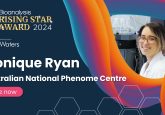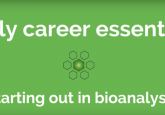Bioanalysis Rising Star Award finalist: Shelby Barnett
Nominated by: Professor Gareth Veal, Newcastle University (Newcastle, UK)
Supporting comments:
“Developmental advances are only truly beneficial if they impact on society in a positive way. The development of novel assays underpinning the therapeutic drug monitoring (TDM) program of work being championed by Shelby over the past 2 years, provides clinicians and families with a unique tool to allow optimization of some of the most challenging childhood cancer patients. This novel approach to treatment has been embraced by the pediatric oncology community and is now used nationally to inform dosing decisions, most notably for the treatment of infants and neonates in the first weeks of life. In addition to the real-time analysis of clinical samples requested by hospitals nationwide, Shelby has successfully progressed the validation of new drug assays to meet clinical need, the development of minimal sampling approaches and multi-drug assays to streamline processing times, and the future potential for point-of-care TDM devices in collaboration with UCL-spin out company Vesynta (London, UK). Shelby has published multiple key publications in the past year, which highlight how bioanalytical work can directly impact patient treatment, with back-to-back papers soon to be published in the European Journal of Cancer alongside an editorial highlighting the importance of the work. A superb example of how the appropriate translation of bioanalytical assay development can make a significant real-world impact and very much a future leader in this area.”
Describe the main highlights of your bioanalytical work
As a research associate working in the Newcastle Cancer Centre Pharmacology Group at Newcastle University, I have the opportunity to work on the translational side of bioanalytical assay development and drug quantification. I lead a TDM program of work that supports the analysis of chemotherapeutics in hard-to-treat childhood cancer patients for 21 primary treatment centers across the UK. These patients include neonates and infants, where marked variability in drug exposures is frequently observed. TDM is conducted through the development of assays to measure drugs levels in patient plasma samples using liquid chromatography−mass spectrometry (LC−MS) and atomic absorption spectroscopy (AAS) approaches. This information is then used by clinicians alongside efficacy/toxicity data to support dosing decisions, ensuring patients receive the most optimal dose of chemotherapy. The success of this work has led to the development of increasing numbers of novel drug assays as a result of TDM requests for increasing numbers of chemotherapeutics. In addition, novel technologies such as multi-drug assays and microsampling approaches have been developed to increase sample throughput. To facilitate more accessible monitoring for future patients I am working in collaboration with Vesynta to develop a point-of-care TDM device.






